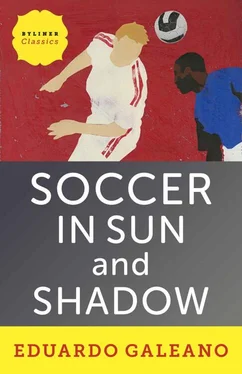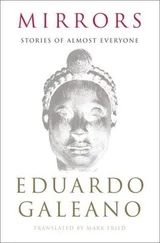A short while later, there was to be a match between the Rio de Janeiro and São Paulo teams. Once again, war clouds threatened and the dailies predicted another Pearl Harbor, a siege of Leningrad, and other cataclysms. The Paulistas knew that the loudest bang ever heard awaited them in Rio. Then the São Paulo manager had a brainwave: instead of hiding in the dressing room, his players would take the field at the same time as the Cariocas. That way instead of scaring them, the bombardment would be a greeting.
And that is what happened, only São Paulo lost anyway, 6–1.
The Man Who Turned Iron into Wind
Eduardo Chillida played goal for Real Sociedad in the Basque city of San Sebastián. Tall and skinny, he had a style of blocking shots that was his very own, and both Barcelona and Real Madrid had their eyes on him. The experts were predicting the boy would succeed Zamora.
But destiny had other plans. In 1943 a rival striker, appropriately named Sañudo, which means “enraged,” smashed Chillida’s meniscus and everything else. After five operations on his knee, Chillida bid goodbye to soccer and became a sculptor.
Thus was born one of the greatest artists of the century. Chillida works with materials so heavy they sink into the earth, but his powerful hands toss iron and reinforced concrete into the air, where they discover other spaces and create new dimensions on the fly. He used to do the same thing in the goal with his body.
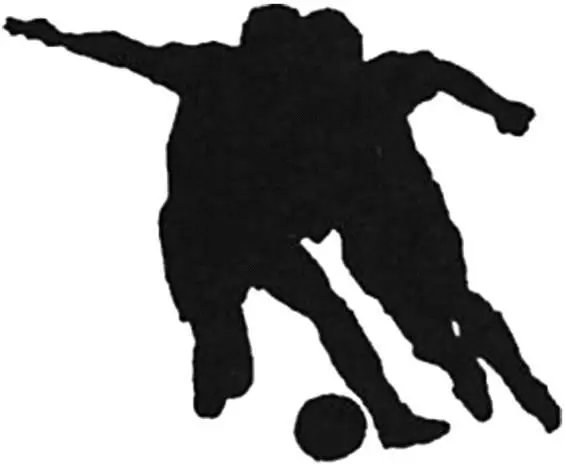
Enrique Pichon-Rivière spent his entire life piercing the mysteries of human sadness and helping to crack open our cages of silence.
In soccer he found an effective ally. Back in the 1940s, Pichon-Rivière organized a team among his patients at the insane asylum. These locos were unbeatable on the playing fields of the Argentine littoral, and playing was their best therapy.
“Team strategy is my priority,” said the psychiatrist, who was also the team’s manager and top scorer.
Half a century later, we urban beings are all more or less crazy, even though due to space limitations nearly all of us live outside the asylum. Evicted by cars, cornered by violence, condemned to isolation, we live packed in ever closer to one another and feel ever more alone, with ever fewer meeting places and ever less time to meet.
In soccer, as in everything else, consumers are far more numerous than creators. Asphalt covers the empty lots where people used to pick up a match, and work devours our leisure time. Most people don’t play, they just watch others play on television or from stands that lie ever farther from the field. Like Carnival, soccer has become a mass spectator sport. But just like Carnival spectators who start dancing in the streets, in soccer there are always a few admiring fans who kick the ball every so often out of sheer joy. And not only children. For better or for worse, though the fields are as far away as can be, friends from the neighborhood or workmates from the factory, the office, or the faculty still get together to play for fun until they collapse exhausted. And then winners and losers go off together to drink and smoke and share a good meal, pleasures denied the professional athlete.
Sometimes women take part too and score their own goals, though in general the macho tradition keeps them exiled from these fiestas of communication.
It was 1946. The Uruguayan club Nacional was beating San Lorenzo from Argentina, so they closed up their defensive lines to meet the threat from René Pontoni and Rinaldo Martino, players who were known for making the ball speak and who had the unfortunate habit of scoring.
Martino got to the edge of Nacional’s area. There he retained the ball and caressed it as if he had all the time in the world. Suddenly Pontoni crossed like lightning toward the right corner. Martino paused, raised his head, looked at him. Then the Nacional defenders all jumped on Pontoni, and while the greyhounds pursued the rabbit Martino entered the box like a parrot into his cage, eluded the remaining fullback, shot, and scored.
The goal was Martino’s but it also belonged to Pontoni, who knew how to confound the enemy.
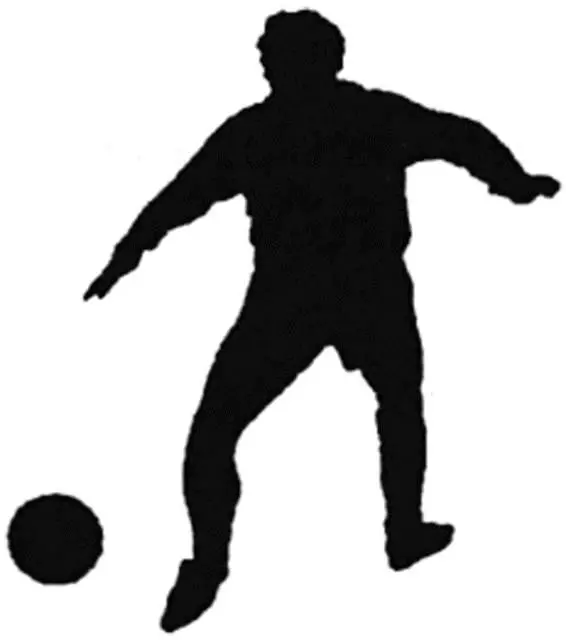
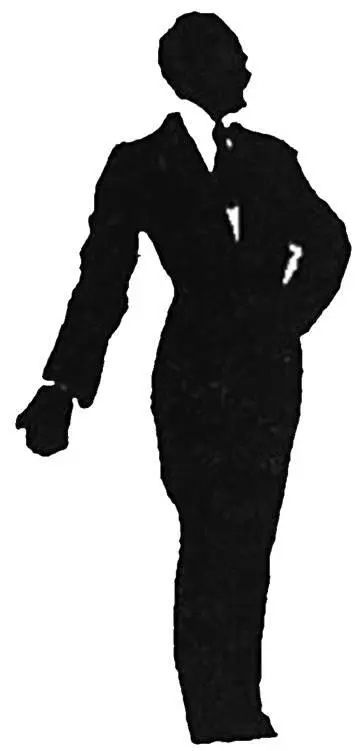
It was 1947. Botafogo against Flamengo in Rio de Janeiro. Botafogo striker Heleno de Freitas scored a chest goal.
Heleno had his back to the net. The ball flew down from above. He trapped it with his chest and whipped around without letting it fall. With his back arched and the ball still resting on his chest, he surveyed the scene. Between him and the goal stood a multitude. There were more people in Flamengo’s area than in all Brazil. If the ball hit the ground he was lost. So Heleno started walking and calmly crossed the enemy lines with his body curved back and the ball on his chest. No one could knock it off him now without committing a foul, and he was in the goal area. When Heleno reached the goalmouth, he straightened up. The ball slid to his feet and he scored.
Heleno de Freitas was clearly a Gypsy. He had Rudolph Valentino’s face and the temper of a mad dog. On the playing field, he sparkled.
One night at the casino he lost all his money. Another night, who knows where, he lost all his desire to live. And on his last night, delirious in a hospice, he died.

Color television was being born, computers were doing a thousand operations a second, and Marilyn Monroe was making her Hollywood debut. A movie by Buñuel, Los Olvidados, was capturing Cannes. Fangio’s Formula One was winning in Monaco. Bertrand Russell was winning the Nobel. Neruda was publishing his Canto General, while Onetti and Octavio Paz were bringing out the first editions of A Brief Life and The Labyrinth of Solitude .
Pedro Albizu Campos, who had fought long and hard for Puerto Rico’s independence, was being sentenced to seventy-nine years in prison in the United States. An informer had squealed on Salvatore Giuliano, the legendary bandit of southern Italy, and he lay dying, riddled by police bullets. In China, Mao’s government was taking its first steps by outlawing polygamy and the sale of children. Wrapped in the flag of the United Nations, U.S. troops were invading the Korean Peninsula with guns blazing, while soccer players were landing in Rio de Janeiro to vie for the fourth Rimet Cup after the long hiatus of the World War.
Taking part in the Brazilian tournament in 1950 were seven countries from the Americas and six from a Europe recently risen from the ashes. FIFA would not let Germany play. For the first time, England joined in the World Cup. Until then, the English had considered such skirmishes to be beneath them. The British side was defeated by the United States, believe it or not, and the goal that put the Americans over the top was the work not of George Washington but of an immigrant from Haiti, a black center forward named Larry Gaetjens.
Brazil and Uruguay waged the final in Maracanã, the home team’s new stadium, the largest in the world. Brazil was a sure winner, the final was going to be a party. Before the match began, the Brazilian players, who had crushed all comers with goal after goal, were given gold watches with FOR THE WORLD CHAMPIONS engraved on the back. The front pages of the papers had been printed up in advance, the immense carnival float that would lead the victory parade was all set to go, half a million T-shirts with slogans celebrating the inevitable victory had already been sold.
Читать дальше
